Strings of hope in a city of ruins
Gaza's young musicians keep playing through war's silence
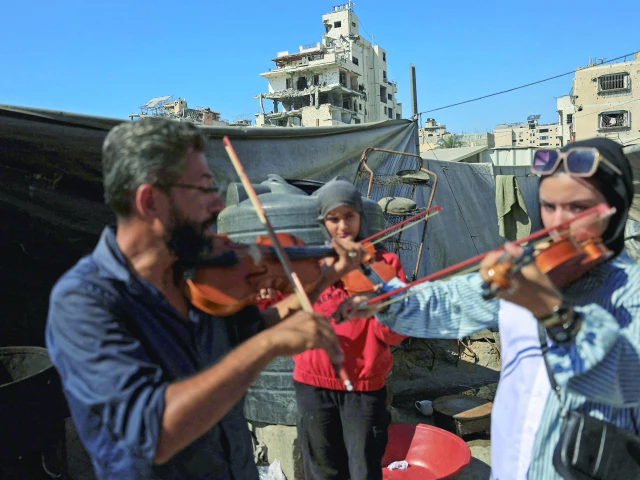
A boy's lilting song drifted through a tent in Gaza City, weaving over the soft hum of instruments and the quiet harmonies of backing singers – a fragile melody that seemed almost otherworldly amid streets now more accustomed to the deadly rhythm of bombs and bullets.
On August 4, young students gathered for a lesson led by teachers from the Edward Said National Conservatory of Music, who have continued instructing from displacement camps and damaged buildings after Israel's bombardments forced the closure of the school's main facility.
"When I play, I feel like I'm flying away," said 15-year-old Rifan al-Qassas, who began learning the oud, an Arab lute, at age 9. "Music gives me hope and eases my fear." Al-Qassas says her dream is to perform abroad one day.
That aspiration resonated during a weekend class at Gaza College, a school battered by shelling. Violence returned to parts of the city on August 12, with Gazan health authorities reporting more than 120 deaths over recent days.
The conservatory was founded in the West Bank and has been a cultural lifeline for Gaza since it opened a branch there 13 years ago, teaching classical music along with popular genres. That changed after Israel launched its war on the enclave on October 7, 2023.
Before the bombardments, Israel sometimes granted the best students exit permits to travel outside Gaza to play in the Palestine Youth Orchestra, the conservatory's touring ensemble. Others performed inside Gaza, giving concerts in both Arabic and Western traditions.
After 22 months of bombardment, some students are now dead, said Suhail Khoury, the conservatory's president, including 14-year-old violinist Lubna Alyaan, killed along with her family early in the war. The school's old home lies in ruins, walls collapsed, and a grand piano had disappeared.
Few instruments have survived the fighting, said Fouad Khader, who coordinates the revived classes for the conservatory. During last week's session, more than a dozen students gathered under the tent's rustling plastic sheets to practice on instruments carefully preserved through the war.
"No fig leaf will wither inside us," the boy sang, a line from a popular lament about Palestinian loss through generations of displacement since the 1948 creation of Israel. Three female students practiced the song Greensleeves on guitar outside the tent, while another group of boys tapped out rhythms on Middle Eastern hand drums.
Teachers have bought some from other displaced people for students to use. But some have been smashed during bombardment, he said. Instructors have experimented with making their own percussion instruments from empty cans and containers to train children, Khader said.
Broad smile
Early last year, Ahmed Abu Amsha, a guitar and violin teacher with a big beard and a broad smile, was among the first of the conservatory's scattered teachers and students to begin offering classes again, playing guitar in the evenings among tents of displaced people in southern Gaza, where much of the 2.1 million population had been forced to move by Israeli evacuation orders and bombing.
After a cease-fire began in January, Abu Amsha, 43, moved back north to Gaza City, much of which has been flattened by Israeli bombing. For the past six months, has been living and working in the city's central district,
For the past six months, he along with colleagues teaching oud, guitar, hand drums and the ney, a reed flute, to students able to reach them in tents or shell-pocked buildings at Gaza College. They also visit kindergartens for sessions with small children.
Outside the music teachers' tent, Gaza City lay in a mass of crumbling concrete, with nearly all residents crammed into shelters or camps with little food, clean water or medical aid. Students and teachers say they have to overcome weakness from food shortages to attend classes.
Sarah al-Suwairki, 20, said hunger and fatigue sometimes make it difficult to walk the short distance to her two music classes each week, but she loves learning the guitar. "I love discovering new genres, but more specifically rock. I am very into rock," she said.
Music therapy
In a surviving upstairs room at Gaza College, the walls pocked with shrapnel scars and windows blown out, three girls and a boy sit for a guitar class. Their teacher, Mohammed Abu Mahadi, 32, said music can help heal Gazans psychologically from the pain of bombardments, loss and shortages.
"What I do here is make children happy from music because it is one of the best ways for expressing feelings," he said. "Music is a glimmer of hope that all our children and people hold onto in darkness," added Ismail Daoud, 45, who teaches the oud.
Elizabeth Coombes, who directs a music therapy programme at Britain's University of South Wales and has done research with Palestinians in the West Bank, said the project could help young people cope with trauma and stress and strengthen their sense of belonging.
"For children who have been very badly traumatised or living in conflict zones, the properties of music itself can really help and support people," she said.
Daoud said the war had stripped people of their creativity and imagination, reducing their lives to securing basics like food and water. "Returning to art is an escape and a reminder of a larger humanity. The instrument represents the soul of the player, it represents his companion, his entity and his friend," he said.



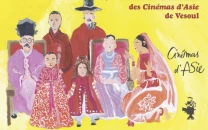
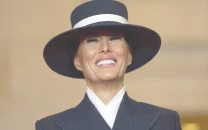
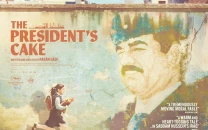
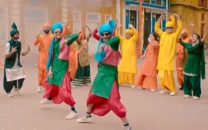












COMMENTS
Comments are moderated and generally will be posted if they are on-topic and not abusive.
For more information, please see our Comments FAQ